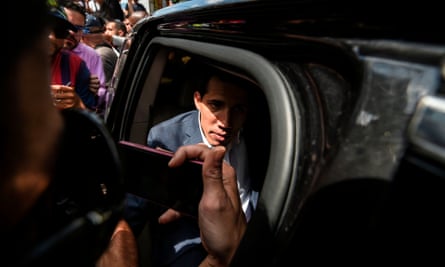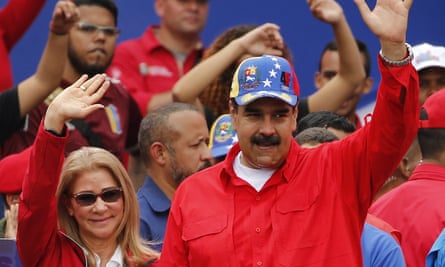Tens of thousands of Venezuelan protesters streamed on to the streets of the capital on Saturday for what they described as the final push to force Nicolás Maduro from power.
“I believe [the end] is coming very soon – this week,” said Barbara Angarita, 49, as she and thousands of other demonstrators poured down the Avenida Principal de las Mercedes in Caracas. “We must have a free country, free for all Venezuelans and for our descendants.”
The feeling that the end was nigh for Maduro – who took power following Hugo Chávez’s 2013 death and has led his country into economic ruin and humanitarian crisis – was inescapable as huge columns of flag-waving demonstrators processed through Caracas and other major cities across Venezuela.
“I think for the first time we are close – very, very close … I guess this is what people in Germany felt in 1989 when the Wall came down,” said Sol Castro Sánchez, 62, a retired university professor.
“They say you have butterflies in your stomach when you are in love. Well, it’s that sort of the feeling … because you know you are part of history,” she added.
“Right now we have him at the edge of the cliff,” Julio Ávila, a television operator, said of Maduro. “All we need to do is push him off.”

Valentina Landaeta, a 22-year-old businesswoman, said: “This is our last opportunity – believe me. If the government doesn’t fall now, it won’t happen. It is now or never.”
Around her, euphoric demonstrators began to dance and chant: “Yo quiero whiskey! Yo quiero ron! Pa celebrar cuando se vaya este cabrón!” (“I want whiskey! I want rum! To celebrate when this bastard is gone!”)
Juan Guaidó, the politician whose recent decision to declare himself Venezuela’s rightful president opened what many believe could be a decisive chapter in the opposition’s battle to bring down Maduro, told supporters they were part of a historic and “unstoppable” movement.
“I have absolute certainty that change is very near in Venezuela,” Guaidó said.
Dissenters had descended on Caracas from across the country to turn up the heat on Maduro, who was returned to office last May in elections widely denounced as a fraud.
Marikeshimä Epianyüü, an indigenous woman from Sierra de Perijá, near Venezuela’s border with Colombia, said she had travelled for more than a day to take part.
“This isn’t a revolution. This is a robbery,” she complained of the Bolivarian crusade Maduro inherited from Chávez six years ago.
“These people have thrown us into the worst misery we have ever suffered in history.”
Américo de Grazia, an opposition politician from the south-eastern state of Bolívar, said he was convinced Venezuela’s military would soon ditch its embattled commander-in-chief. “I believe it is a matter of hours.”

Many carried homemade banners or posters emblazoned with slogans such as: “No more dictatorship”, “I’m fighting for my country and the return of my children!” and “The senior citizens are tired of your lies Maduro”.
The children were angry too. “I want Nicolás out,” said Joswald Castro, a five-year-old boy from a poor Caracas community called El Cementerio. Why? “So we can eat,” he replied.
María Vallera, from Petare, a sprawling slum in the city’s east, had brought a statue of the Virgin of the Valley to the march, hoping she would boost the opposition cause.
“I’m 75 years old and I’ve never experienced a nightmare like this of hunger, misery and scarcity,” Vallera complained. “It is a nightmare – a true nightmare.”
Huge crowds gathered in other Venezuelan cities to demand Maduro’s exit.
“Look, I think these are the final days,” said Alberto Paniz-Mondolfi, a doctor who was one of tens of thousands protesting in Barquisimeto, Venezuela’s fourth-largest city.
Large demonstrations were also reported in Barinas, capital of the state where Chávez was born and raised, and Maracaibo, the country’s No 2 city.
Maduro struck a defiant note at a rival pro-government march in central Caracas commemorating the 20th anniversary of Chávez’s inauguration as president, on 2 February 1999.
He accused the “imperialist” US president, Donald Trump, of launching a “ghoulish plan” to dethrone him in order to seize Venezuelan resources.
“You think you are the emperor of the world – that Venezuela will surrender and obey your orders. But know this: Venezuela will not give in. Venezuela will advance. Venezuela is rebellious. Venezuela is free, sovereign and independent.
“I ask all Venezuelans: should we hand the sovereignty of our country over to the gringos?” Maduro shouted.

“No!” the crowd cried back.
“Should we hand our oil wealth over to Donald Trump? Should be become a gringo colony?”
“No!” Maduro’s supporters replied.
Gredy Arrieta, 19, a port worker who had travelled 700km from the city of Maracaibo to the pro-Maduro rally, said he was aware all was not well in his oil-rich nation. “There are numerous problems that haven’t been solved yet. But he [Maduro] has done good and he has fought for the country.”
On the wall beside him, a rebel artist had daubed the word “tyranny” in large red letters.
Back at the opposition march, Ignacio Rangel, a 28-year-old English teacher, said he was unsure how long Maduro might last or how he might leave power – through peaceful negotiations, through a coup, or perhaps even through a US military intervention.
“I wouldn’t like for it to happen – but if it has to go that way, I’m all for it,” he said of the last option.
Of one thing Rangel and many others marchers seemed convinced.
“There is no more chavismo,” he said. “Chavismo is over.”